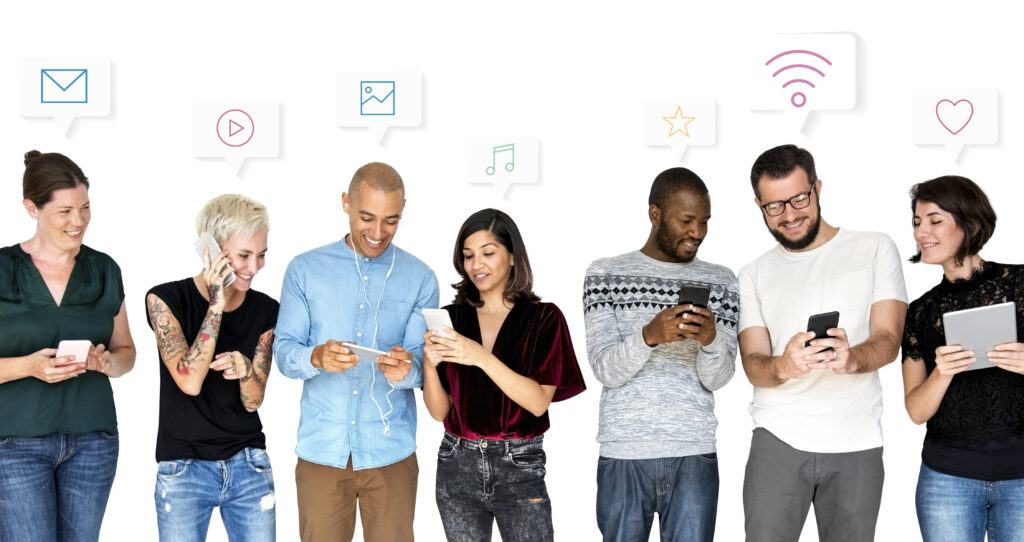Although with Computers Internet & Smartphones it is becoming increasingly difficult to distinguish between the real and virtual worlds. As this digital integration grows the distinction between business and personal life has become more hazy. In our day and age, making it essential to be able to adjust to this connected environment. The need for careful and responsible integration of these revolutionary technologies into our lives. This is highlighted by the fact that, even though this fusion of technologies offers previously unheard-of levels of convenience and connectedness. It also raises significant concerns about privacy, security, and the ethical implications. From a world where everything is becoming computerized and internet-driven.
The combination of computers, the internet, and smartphones has become an everyday force in the never-ending progress of technological advancement. Changing the way we interact, work, and travel the world. We are now living in a time where almost everything is impacted. By the effect of these interconnected technologies due to digital convergence.
The smooth integration of hardware and software across industries is a clear indication of how commonplace computers have become. Computers have evolved into essential tools, improving productivity, encouraging creativity. There by reducing procedures in both traditional office settings and production floors. By connecting various devices and enabling the instantaneous transmission of information. The internet acts as a massive digital highway that creates a worldwide network where physical boundaries are blurred.
Smartphones have become the standard for personal computing devices; they are tiny marvels that put computer capability at our fingertips. These portable devices have developed beyond their initial intended use for communication. They have become multipurpose instruments that work as our cameras, entertainment centers and navigational aids. Not to mention portals to the wide world of the internet. Smartphones are now in the spotlight thanks to the development of mobile applications. Which provide a wide range of features and services to suit a variety of demands and tastes.
Computers, the internet, and smartphones represent the pillars of the digital age. Transforming how we live, work, and interact with the world. Computers, whether desktops or laptops, serve as powerful devices for processing data, running software, and accessing information.
I really didn’t realize that you could pretty much do the same thing on your smartphone. Then after having a smartphone it finally came to my attention that smartphones were just mini-computers. I found out you could use the same search engines and apps just like on my laptop. It gave me pleasure when I saw how easy it was to use on the internet. Things like Google was real simple to use on my phone.
The internet, a vast network connecting billions of devices worldwide, serves as a conduit for communication, collaboration, and information exchange. It enables instant access to a wealth of knowledge, entertainment, and resources, shaping our daily lives in profound ways.
Smartphones, equipped with computing capabilities and internet connectivity. And it has revolutionized personal computing by putting powerful technology in the palm of our hands. They serve as multifunctional devices, allowing us to communicate, browse the web, access apps, and capture memories on the go.
Together, computers, the internet, and smartphones form an interconnected ecosystem that facilitates seamless communication, empowers productivity, and fosters innovation. However, they also raise concerns about digital privacy, cybersecurity, and information overload. As these technologies continue to evolve. They will continue to shape the future of society, economy, and individual experiences in profound and unpredictable ways.
Computers, the internet, and smartphones represent the pillars of the digital age, shaping how individuals communicate, work, learn, and interact with the world around them. These interconnected technologies have revolutionized virtually every aspect of modern life, offering unprecedented levels of connectivity, convenience, and access to information.
Computers serve as powerful tools for processing, storing, and manipulating data, enabling tasks ranging from basic word processing and spreadsheet management to complex data analysis and programming. Whether desktops, laptops, or tablets, computers provide versatile platforms for productivity, creativity, and entertainment.
The internet acts as a global network that connects computers and devices worldwide, facilitating communication, collaboration, and information sharing on an unprecedented scale. Through websites, search engines, social media platforms, and online forums, the internet provides access to a vast array of resources, services, and communities, empowering individuals to connect, learn, and engage with people and information from diverse backgrounds and perspectives.
Smartphones, equipped with advanced computing capabilities and internet connectivity, have revolutionized how people access and interact with digital content and services. With features such as touchscreens, mobile apps, GPS navigation, and high-speed internet access, smartphones offer unparalleled convenience and functionality, allowing users to stay connected, productive, and entertained on the go.
Moreover, the integration of the web and smartphones has transformed industries such as commerce, healthcare, education, and entertainment. From e-commerce platforms and telemedicine services to online learning platforms and streaming media services, these technologies have reshaped business models, consumer behavior, and societal norms, driving innovation and economic growth.
However, the widespread adoption of computers, the internet, and smartphones also raises concerns about cybersecurity, privacy, and digital addiction. As technology continues to evolve, addressing these challenges becomes increasingly important to ensure the safe, responsible, and equitable use of digital technologies for all.
In summary, computers, the internet, and smartphones have revolutionized how people connect, communicate, and interact in the digital age. With their vast potential and transformative impact, these technologies continue to shape the future of humanity, driving innovation, connectivity, and progress in the digital era.
The “Internet of Things” (IoT) era, in which common things are implanted with sensors. And connected to the internet, enabling them to communicate. And exchange data, was brought about by the convergence of computers, the internet, and smartphones. Convenience and efficiency are of the utmost importance in the smart and connected world. That is being created by our homes, cars, wearables, and even kitchen appliances.

